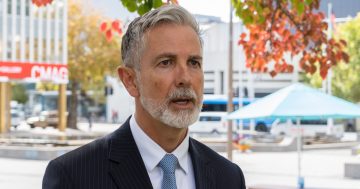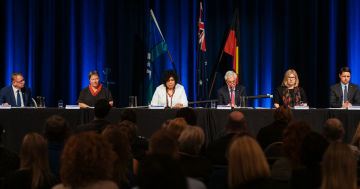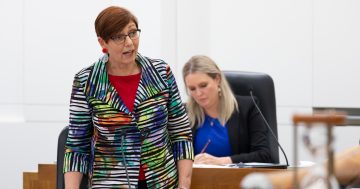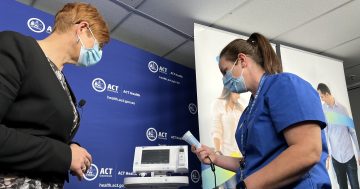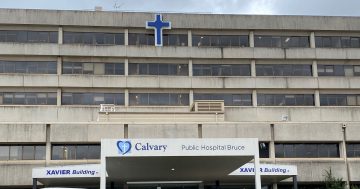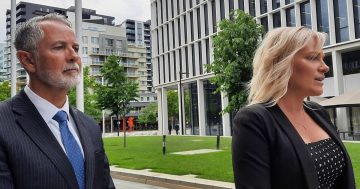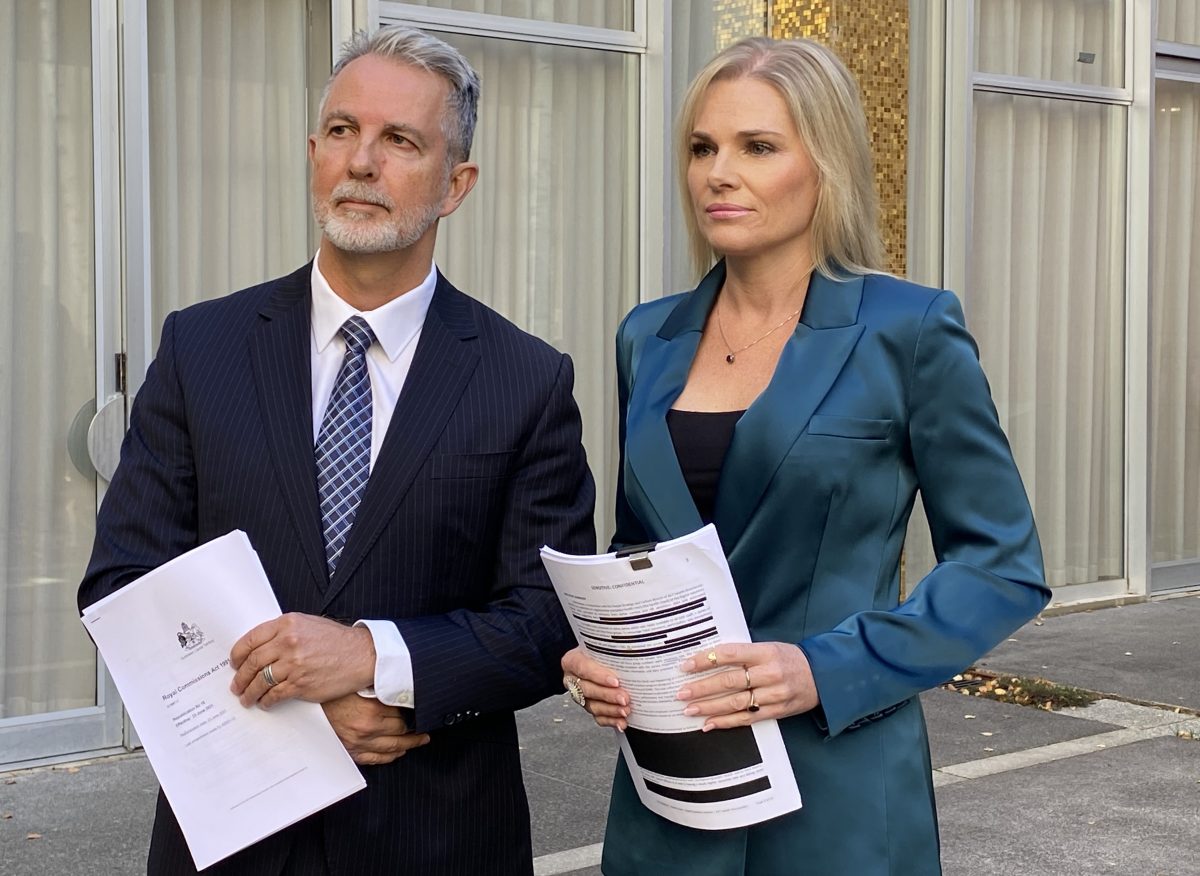
Canberra Liberals acting leader Jeremy Hanson and shadow health minister Leanne Castley clasping a redacted government health FOI document. Photo: Claire Fenwicke.
Only a royal commission into the ACT’s healthcare system will rectify the current issues now and into the future – that’s the stance of the Canberra Liberals, promising to take the issue to the next election.
“If you look at the deterioration of our healthcare system over a decade, we used to have the best-performing health system in Australia, now we’ve got the worst performing,” Acting Leader Jeremy Hanson said.
“The government’s repeated assurances that they’re going to fix it – they’re the ones that have been in government for 21 years. They’re the ones who have broken it.”
The ACT has the power to hold such an inquiry under the Royal Commissions Act 1991, but one has never been held in the Territory.
The Canberra Liberals want the current government to commit to holding a healthcare royal commission before the next election, but Mr Hanson said the party could wait for the recommendations to be published after the 2024 votes came in.
“We don’t want this to be a political issue. What we want is to fix the health system,” Mr Hanson said.
“Surely whoever is the health minister [after the election] would want the sort of information, the recommendations, the advice, from a royal commission, and to dismiss it and say, ‘we’re not going to do it because we’ve got all the answers’, is rubbish.”
If the current government doesn’t agree, the Canberra Liberals have committed to holding one if they gain power.
Our healthcare system has been found to be lacking, with the country’s longest wait times in emergency departments, extensive wait times for elective surgery, the Fetal Medicine Unit losing its training accreditation, poor culture and systemic issues, and patient privacy breaches.
Health spending makes up about a third of the ACT’s budget.
While royal commissions are known to be expensive and lengthy processes, Mr Hanson said it would be worth it.
“It is a small amount of money that’s worth it to fix the healthcare system,” he said.
“It will take time, it will take resources, but that’s what’s necessary. Just having limited, spot fire reviews, trying to put out limited problems as they arise, isn’t the answer here.”
Shadow Health Minister Leanne Castley added a royal commission was just one idea the party had to improve our healthcare system.
While she wouldn’t elaborate on what those other ideas were, she said policies were being formulated ahead of the election.
“This is the best place to start because we have heard of so many issues across the board, so understanding the crux of the situation and working out the best way forward,” she said.
Health Minister Rachel Stephen-Smith rejected the need for a royal commission, stating recent whole-of-system reviews and strategies meant the government already had a clear understanding of the issues being faced now and into the future.
“It’s very difficult to see how a royal commission could take a broader approach than we [already] have,” she said.
Ms Stephen-Smith described royal commissions as a great vehicle for truth-telling, especially for marginalised communities or areas where there hasn’t been transparency.
But she said ACT’s healthcare wasn’t a place where this would be effective.
“There’s a lot of transparency, there is a lot of sunshine on this, and there are a lot of plans in place and reviews that have been done to already identify the challenges, and now our work is to get on and implement [them],” Ms Stephen-Smith said.
“Of course, we’ve got challenges in our healthcare system, but these are not unknown challenges.”
Ms Stephen-Smith viewed the announcement as an indication the Canberra Liberals had no alternatives to offer and said a royal commission would just delay change.
“They can’t see anything that could be done differently from what the government is already doing at the moment,” she said.
“These challenges exist now. The ACT Government is acting now. We’ve got the plans and strategies in place and we’re already starting to implement those.”
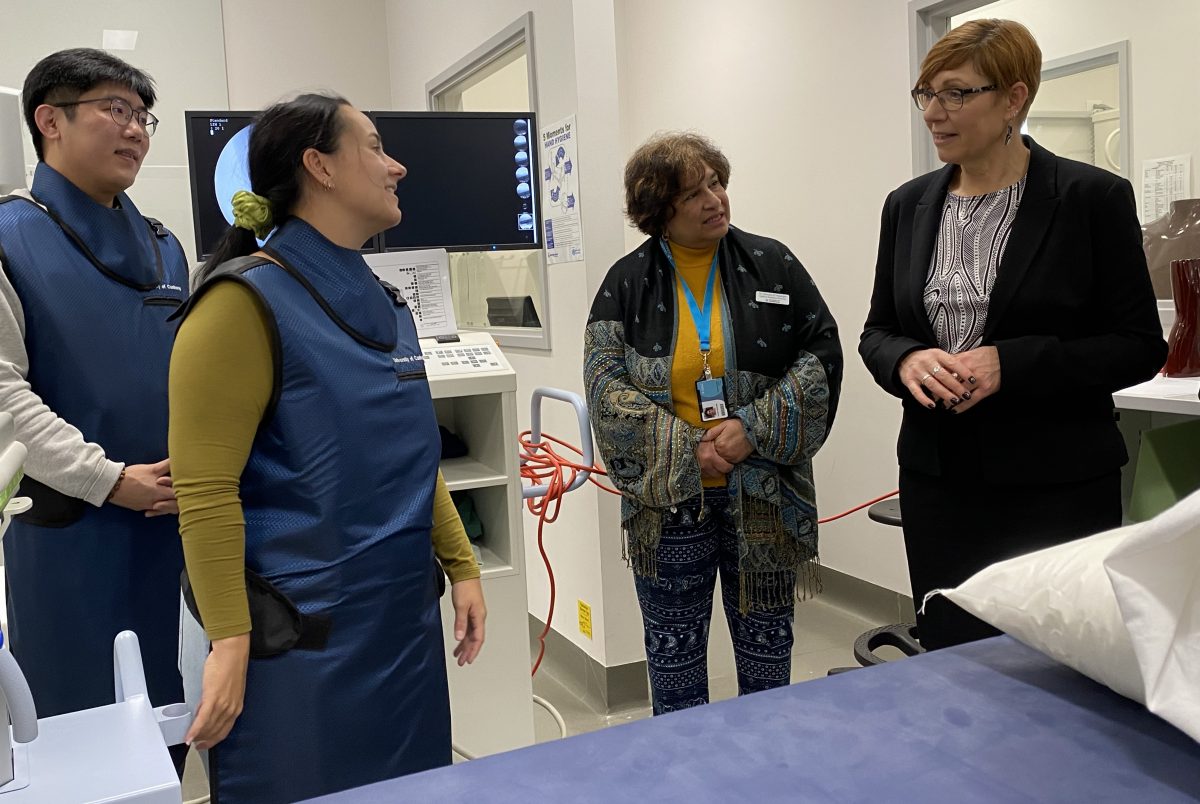
Rachel Stephen-Smith met with University of Canberra teachers and students as part of the ACT Health Workforce Strategy 2023-2032 announcement. Photo: Claire Fenwicke.
One of those plans is the ACT Health Workforce Strategy 2023-2032, announced on Thursday (4 May) to attract and retain more staff.
It identified eight priority areas to target specific workforce needs, with 23 actions either already underway or about to commence.
These include collecting data on when staff members plan to retire to fill their roles, implementing the Health Workforce Wellbeing and Recovery Fund, improving career pathways into health for people with disabilities, and developing a discussion paper on barriers and opportunities to increase flexibility, and mobility across the healthcare system.
Ms Stephen-Smith said this would continue improving and strengthening our healthcare system into the future.
“We are never going to have a perfect health system, such a thing does not exist anywhere in Australia or anywhere in the world,” she said.
“What we do have is a holistic plan, through the ACT Health Services Plan released last year, and now a 10-year Workforce Strategy to address the challenges we already know that we face.”













